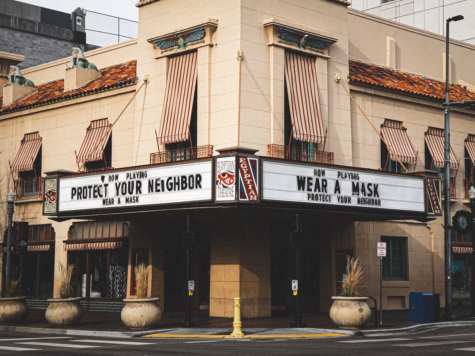Movie Theaters and Mental Health: Is There a Correlation?
As the world reopens, the cinema can provide medically-proven relief.
Slowly but surely, people are returning to movie theaters for comfort, distraction, and company.
As moviegoers clutch their ticket receipts with delight, savoring the smell of buttered popcorn, sounds of Coca-Cola ads and never-ending previews, the reopening of movie theaters across the United States can be deemed to be ‘official,’ accompanied by confidence for the improvement of our mental health as we navigate this new reality of life amidst the COVID-19 pandemic.
Worldwide, mental health struggles for teenagers have worsened throughout the Coronavirus pandemic. According to a study conducted by Sheri Madigan, an associate professor of clinical psychology and Canadian child development researcher at the University of Calgary, 25% of adolescents suffer from increased depression symptoms, 20% experience increased anxiety symptoms, and more than 33% of high schoolers have felt “persistent feelings of sadness or hopelessness” in recent years. These statistics show a 40% surge over the last decade. The Coronavirus pandemic has only heightened these effects, as some teenagers’ sleep patterns deteriorated, and some teenagers became withdrawn and/or aggressive.
Cinema therapy is a clinically-recognized coping mechanism that can be prescribed by therapists in order to promote catharsis and emotional release. It has even been used for inmates in prison. Movies can provide perspective or a relieving break from reality. Suspenseful movies release cortisol, which then triggers dopamine, a neurotransmitter linked to happiness. The English Longitudinal Study of Ageing (ELSA) found that people who attended exhibitions, theaters, or movies monthly were 48% less likely to show symptoms of depression.

Movies can have physical benefits, too, that mirror those of running or other cardiac endeavors. In some ways, watching movies can be as beneficial for you as cardio. Scientists at the University College London found that attending a movie can improve heart, memory, and concentration to the same extent as a mild workout. However, these advantages come solely from in-person experiences — places where we must focus entirely on one subject — rather than online streaming services where people are more prone to distraction.
A distinct difference exists between overindulging in streaming and committing time to watch movies in a controlled environment (like a theater). In a survey that I conducted at Bronx Science, close to 100% of participants admitted to excessive binge-watching last year as a means of coping with the Coronavirus pandemic. “Having a movie night with friends and family and going outside can benefit your mental health, but binge-watching Netflix definitely has negative effects,” said Jacey Mok ’24.
Although my survey sample size was small, the ten students interviewed spanned different grades and held a range of perspectives about attending in-person movies. While some experienced discomfort at the idea of attending an in-person movie at a cinema, other students indicated that the ability to attend an in-person movie at a theater signified a greater hope that something closer to normalcy may be possible in the months and years to come.
Going to movie theaters can serve as motivation to leave the house and get fresh air. “I really don’t go outside much, but going outside and [then] back inside made me feel better than [just] staying inside,” said Nicholas Gavalas ’23. After more than a year of closures, movie theaters are accessible once again. According to CNBC, more than 97 percent of theater chains have reopened, and there are almost 300 theaters in New York State alone. With safety concerns paramount, the Fandango movie precautions for COVID-19 currently include cleaning and sanitizing, face masks, vaccination requirements, physical distancing, reduced capacity, and limited concessions. Theaters themselves have contactless ticket purchases and reservations, contactless ticket entry, and easy refunds.

These measures have contributed to positive ratings from viewers, as Fandango found that 93 percent of 4,000 ticket purchasers enjoyed the movie experience, and 87 percent of those viewers mentioned how safe they felt, COVID-wise, in the theaters. Eighty-seven percent also stated that the movie-going experience is not replicable at home. COVID-19 has inspired new contactless establishments, including Cinemark’s “Snack in a Tap,” private auditorium rentals, loyalty programs, staggered showtimes, and added perks, like additional reclining chairs, more expansive menus, and even the option for concession delivery at your seat.
For those looking for a new outlet or haven from the nonstop business of their lives, movie theaters may provide much needed solace or can simply be a source of enjoyment. “It has been a long time since I went to a movie theater, and so seeing a film on the big screen was super fun, as was getting popcorn and candy,” said Chahat Aujla ’25. Because reopening theaters is such a new development, it is too early for statistics to be studied, but the response of the general public is overwhelmingly positive. Of course, some people find the movie experience to be too overwhelming or the ticket prices to be too expensive, and there is nothing wrong with that.
After such a tumultuous eighteen months of the Coronavirus pandemic, each person is at their own place in their individual journey. Cinema therapy is not the only answer for those with mental health challenges and should never replace the guidance of trained professionals.
Scientists at the University College London found that attending a movie can improve heart, memory, and concentration to the same extent as a mild workout.
Hallel Abrams Gerber is an Editor-in-Chief for ‘The Science Survey,’ using her writing to represent a myriad of social issues and innovations, bolster...











